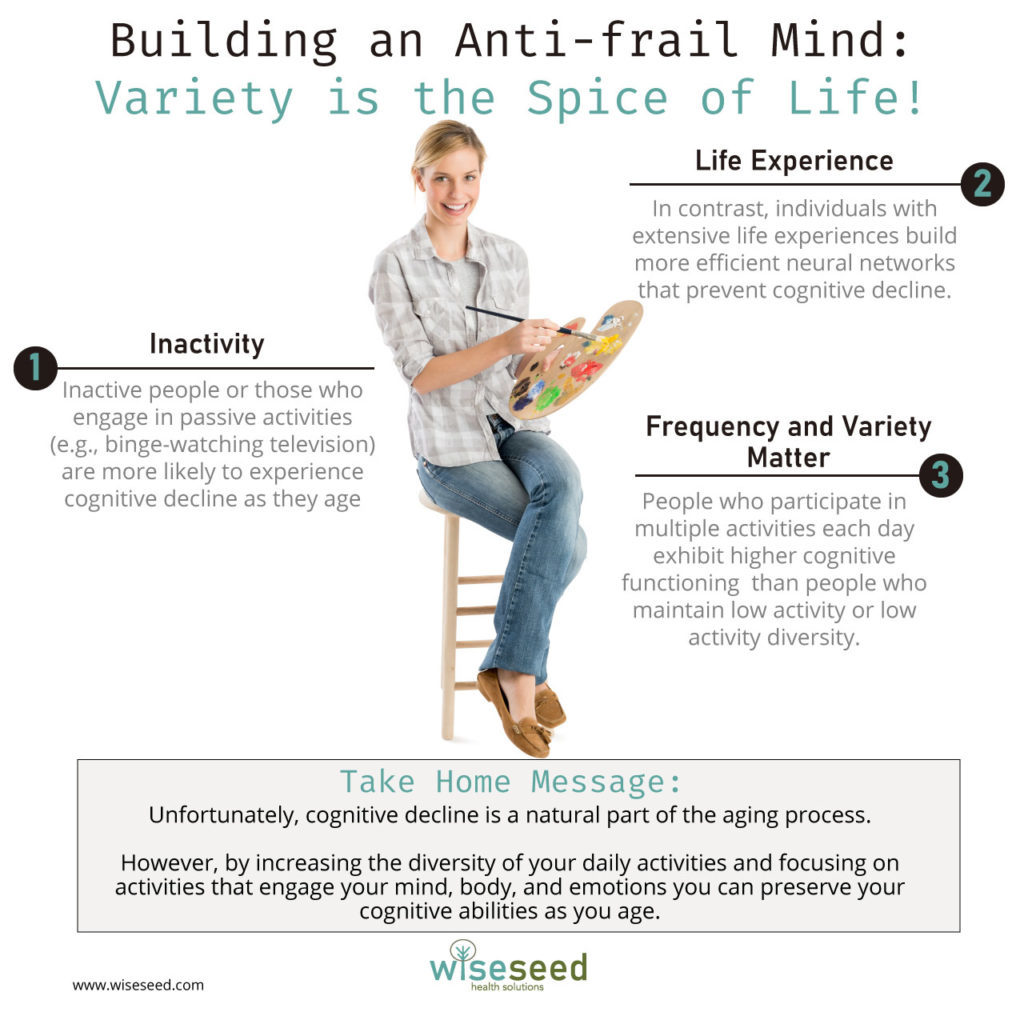Building an Anti-frail Mind: Variety is the Spice of Life!

The mind grows and decays with the body
Lucretius
It’s an unfortunate fact that your brain, and therefore your mind, ages alongside your body.
However, you can preserve your precious cognitive power by staying active and engaging with life across various domains.
Building an Anti-Frail Neural Network
In theory, individuals with extensive life experiences (engaging in education and stimulating leisure activities) build more efficient neural networks that prevent cognitive decline (1). In contrast, inactive people or those who engage in passive activities, for example, binge-watching television, are more likely to experience cognitive decline as they age (2).
What’s the best way to structure your daily life to maximize your life experience and build an anti-frail neurological network?
To find out, Lee and Colleagues compared how the number of activities and the evenness of activity participation preserved cognitive function across ten years to answer this question (3).
But First, What are Executive Functions, and Why are they Important?
Executive functions (EF) are a group of three fundamental processes that work together to support higher-order cognitive functions such as reasoning, problem-solving, and planning. Moreover, it turns out that executive functions are a strong predictor of life success, perhaps even more so than high IQ!
Executive Function 1: Inhibitory Control
Inhibitory control includes self-control and focused attention.
Self-control regulates your behavior and emotions in the service of achieving specific goals and making responses that are strategic and considered.
In contrast, focused attention is the ability to concentrate on what is essential while ignoring distractions. Focused attention allows you to focus on the task at hand despite the presence of interfering thoughts, memories, and external distractions.
Executive Function 2: Working Memory
Working memory is a specific type of memory that allows you to hold information in your mind and work with it simultaneously.
Examples of working memory include planning a route while traveling, changing the order of a to-do list, or holding a question in mind while continuing a conversation. Further, working memory supports your ability to solve complex problems by exploring interesting relationships between remembered facts and rearranging stored information into new and creative combinations.
Executive Function 3: Cognitive Flexibility
Flexible thinking underpins your ability to adapt to change, take advantage of new opportunities, and cope with unexpected setbacks.
Having a flexible mind allows you to see a problem from different perspectives. It lets you think outside the box and develop new ways of viewing a problem and invent original approaches to solve a problem.
Thus, cognitive flexibility is the foundation of problem solving and creativity.
Does Activity Diversity Preserve Cognitive and Executive Function?
To assess how activity diversity influences cognitive decline over time, Lee and Colleagues followed a group of over 700 adults over ten years (3).
They measured two variables: 1) diversity of activities performed and 2) evenness of activities undertaken over time. Then, they converted these two factors into a single activity score that ranged from zero (no diversity) to one (complete diversity) (3).
For example, a participant who engaged in only a single activity within a week has an activity diversity score of near zero. In contrast, an individual who participated in multiple activities each day had an activity diversity score close to one.
How does Activity Diversity influence Cognitive Decline?
Influence of Activity Diversity on Overall Cognitive Function
People with high levels of activity diversity and those who increased their activity diversity over ten years exhibited higher overall cognitive functioning levels than people who maintained low activity diversity or decreased their activity diversity (3).
Thus, either maintaining a high level of activity diversity or increasing your activity diversity may protect your overall cognitive function as you age.
Influence of Activity Diversity on Executive Function
Fortunately, activity diversity also protected the executive function of people enrolled in the trial. Those participants who maintained a high level of diverse activities or increased their activity diversity exhibited higher executive function levels than those who decreased their activity diversity (3).
Thus, either maintaining a high level of activity diversity or increasing your activity diversity may protect your executive functions as you age.
How to Implement this Knowledge to Preserve Your Cognitive Functions
The implication from this and other studies is clear. It is best to perform a range of activities each week to keep your mind sharp (3).
What sort of activities are we talking about here? It’s recommended that you include activities that cover the entire gamut of life, from professional (career/volunteering) to friends and family, fitness, and hobbies.
The key is variety and consistency (3). Daily engagement with different activities that activate diverse cognitive functions, such as social, emotional, physical, creative, analytical, and strategic cognition, is optimal for preserving cognition into old age.
And don’t forget that the quality of your activities also matters. For example, active hobbies that involve learning and applying different skills, such as playing music, learning a new language, creating art, or tinkering with mechanics, are far more beneficial than passive activities that don’t engage your mind (3).
Take-Home Message
You can preserve your cognitive abilities as you age by performing several different activities each day that engage your mind, body, and emotions.

References and Further Reading
1. C. Pettigrew et al., Self-reported lifestyle activities in relation to longitudinal cognitive trajectories. Alzheimer disease and associated disorders 33, 21 (2019).
2. D. Fancourt, A. Steptoe, Television viewing and cognitive decline in older age: findings from the English Longitudinal Study of Ageing. Scientific Reports 9, 1-8 (2019).
3. S. Lee, S. T. Charles, D. M. Almeida, Change is good for the brain: activity diversity and cognitive functioning across adulthood. The Journals of Gerontology: Series B 76, 1036-1048 (2021).
Acknowledgments
Images created by tetmc and simonapilolla
Disclaimer
The material displayed on this website is provided without any guarantees, conditions or warranties as to its accuracy.
Information written and expressed on this website is for education purposes and interest only. It is not intended to replace advice from your medical or healthcare professional.
You are encouraged to make your own health care choices based on your own research and in conjunction with your qualified practitioner.
The information provided on this website is not intended to provide a diagnosis, treatment or cure for any diseases. You should seek medical attention before undertaking any diet, exercise, other health program or other procedure described on this website.
To the fullest extent permitted by law we hereby expressly exclude all warranties and other terms which might otherwise be implied by statute, common law or the law of equity and must not be liable for any damages whatsoever, including but without limitation to any direct, indirect, special, consequential, punitive or incidental damages, or damages for loss of use, profits, data or other intangibles, damage to goodwill or reputation, injury or death, or the cost of procurement of substitute goods and services, arising out of or related to the use, inability to use, performance or failures of this website or any linked sites and any materials or information posted on those sites, irrespective of whether such damages were foreseeable or arise in contract, tort, equity, restitution, by statute, at common law or otherwise.

Ten Minutes is All You Need
Research has shown that ten minutes of moderate-to-vigorous exercise performed each day is enough to significantly reduce your risk of early death.

Thriving in Solitude: Making Sense of Your Life
When you are self-aware and your values and actions are aligned, life makes sense. As a result, you have a more positive outlook, you feel authentic, and you are on the path to meaning.




